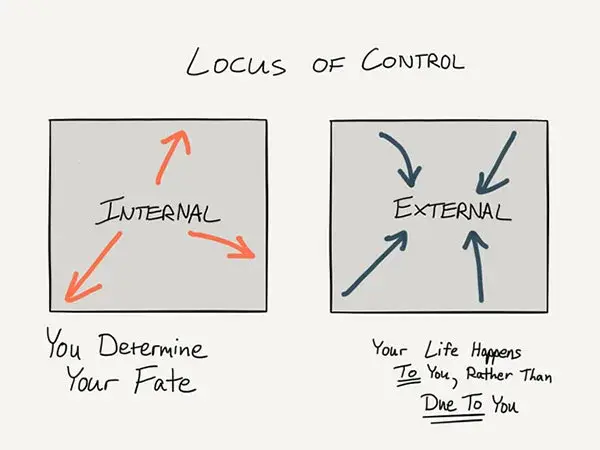PSYCHOTHERAPY
What’s in my grasp, what’s out of my grasp? The never-ending need to feel in control offset with the illusion of ever even having it. The concept of locus of control is central to addiction recovery as it is to all of behavioral health. The simplest way of describing this is through a sketch:
This is an abstract psychological concept that mainly involves perspective. There is a philosophical approach in therapy which says a distorted perspective is the source of your suffering. Connected to this, a distorted reality around the locus of control is hurdle number one for a perpetually struggling person.
Changing Definitions of Control
Now, we need to acknowledge that control tends to change from situation to situation. For example, if you are out of the home, and someone crashes into your parked car on the street, this is entirely out of your control. We’ll use this as a benchmark for 0% control. Now, let’s extend that example and increase your relative control or involvement in the scenario. If you are driving in your car and make no errors, and get hit by another vehicle, your calculated locus of control increases to 10%. If you don’t believe this is true and feel you should have zero responsibility, go ask your insurance carrier!
Increasing control a step further, let’s assume you are in a car accident when someone else is driving erratically, but you also are speeding at the time and don’t have enough space to slow down. How much percentage fault should we assign to you? Your locus of control in each of these scenarios is increasing, as a way of describing your ownership in the problem.
Distortions of Extremes
As an alternative example, the functioning in the workplace involves locus of control as well. We have experienced many people talking about lost careers as if they were a victim in the workplace. They were fired because their boss would target them personally. There are instances in which this is true, but what should we do if that similar explanation applies to this person’s last three jobs?
Eventually, we have to take a look at the ownership of the situation by the person. If that person tends to live through a lens of external locus of control, they might get furious at a therapist for suggesting that they had a role in getting fired. The therapeutic goal is emotionally moving towards more of an internal position.
Conversely, a person with an almost 100% internal locus of control mentality will often experience overwhelming anxiety, as they are continually self-blaming and fixated on what they did wrong. This person is not fully appreciating concepts of variance and chance. The perspective of having complete control or ownership in a situation is often a fallacy and can lead to the same level of suffering as the individual with an entirely external mindset.
A Balanced Position
A psychologically healthy person will exhibit balance around the locus of control. Understanding when one is a victim, embracing when one has responsibility. Addiction recovery functions well within the domain of the locus of control. There is a common approach in 12-step communities using a dialectic blend. It basically looks like this:
Once again, our goal in this process is really two-fold:
- You have an addiction which is a DISEASE and is not your fault
AND - If you heal or continue to suffer, it’s ON YOU
We usually identify a 70-80% zone as a healthy goal. This acknowledges change, victimization, and the external forces in our world while simultaneously placing primary ownership with the person.
Once again, our goal in this process is really two-fold:
- Looking at our perspectives
- Alleviating suffering
This continuum and mindset will determine so much when it comes to recovery and healing. Finding an appropriate balance is one of the core traits of a healthy, functional person.
Read more CeDAR Education Articles about Psychotherapy including Wise Mind.


